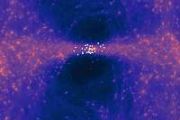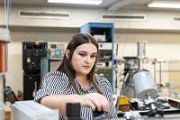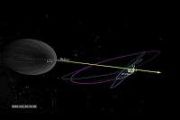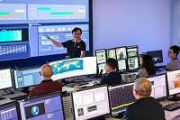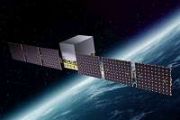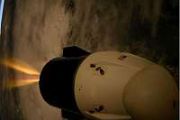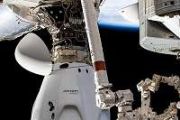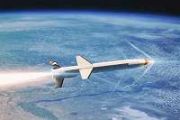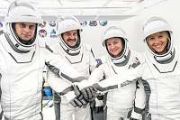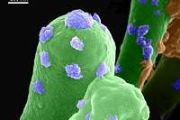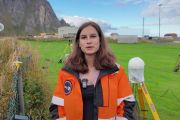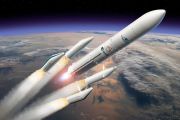
Copernical Team
Mercury's magnetic field explored by BepiColombo flyby
 During its June 2023 flyby of Mercury, ESA's BepiColombo spacecraft gathered critical data on the planet's magnetic field, offering insights into its dynamic magnetosphere. This brief encounter hints at the deeper mysteries BepiColombo will uncover when it enters orbit in 2026.
Mercury, like Earth, has a magnetic field, though it is about 100 times weaker. Despite this, the planet's magnet
During its June 2023 flyby of Mercury, ESA's BepiColombo spacecraft gathered critical data on the planet's magnetic field, offering insights into its dynamic magnetosphere. This brief encounter hints at the deeper mysteries BepiColombo will uncover when it enters orbit in 2026.
Mercury, like Earth, has a magnetic field, though it is about 100 times weaker. Despite this, the planet's magnet New seismic data unveils detailed view of 9 km asteroid crater beneath Atlantic
 Researchers from Heriot-Watt University have released new high-resolution images of the Nadir Crater, an asteroid impact site buried deep beneath the Atlantic Ocean. The crater, located about 300 meters below the seafloor, spans approximately 9 kilometers in width and was formed by an asteroid collision around 66 million years ago, at the end of the Cretaceous period.
The Nadir Crater, dis
Researchers from Heriot-Watt University have released new high-resolution images of the Nadir Crater, an asteroid impact site buried deep beneath the Atlantic Ocean. The crater, located about 300 meters below the seafloor, spans approximately 9 kilometers in width and was formed by an asteroid collision around 66 million years ago, at the end of the Cretaceous period.
The Nadir Crater, dis Northrop Grumman selected to lead production of hypersonic interceptor
 The U.S. Missile Defense Agency (MDA) has selected Northrop Grumman Corporation (NYSE: NOC) to advance the development of the Glide Phase Interceptor (GPI), the first defensive countermeasure designed to address the growing threat of hypersonic missiles. This next phase of the program follows a three-year collaboration with MDA that has resulted in an innovative design aimed at neutralizing both
The U.S. Missile Defense Agency (MDA) has selected Northrop Grumman Corporation (NYSE: NOC) to advance the development of the Glide Phase Interceptor (GPI), the first defensive countermeasure designed to address the growing threat of hypersonic missiles. This next phase of the program follows a three-year collaboration with MDA that has resulted in an innovative design aimed at neutralizing both Critical stress testing completed for Gateway Module
 NASA's Gateway space station has achieved a key milestone in its development. The Habitation and Logistics Outpost (HALO) module successfully completed static load testing in Turin, Italy, moving it closer to its final preparation for launch into lunar orbit.
This major hardware test marks an important step in Gateway's journey to the Moon, where it will serve both scientific missions and
NASA's Gateway space station has achieved a key milestone in its development. The Habitation and Logistics Outpost (HALO) module successfully completed static load testing in Turin, Italy, moving it closer to its final preparation for launch into lunar orbit.
This major hardware test marks an important step in Gateway's journey to the Moon, where it will serve both scientific missions and Nuclear rockets could travel to Mars in half the time
 NASA plans to send crewed missions to Mars over the next decade - but the 140 million-mile (225 million-kilometer) journey to the red planet could take several months to years round trip.
This relatively long transit time is a result of the use of traditional chemical rocket fuel. An alternative technology to the chemically propelled rockets the agency develops now is called nuclear therma
NASA plans to send crewed missions to Mars over the next decade - but the 140 million-mile (225 million-kilometer) journey to the red planet could take several months to years round trip.
This relatively long transit time is a result of the use of traditional chemical rocket fuel. An alternative technology to the chemically propelled rockets the agency develops now is called nuclear therma Space Command working with Office of Space Commerce for spaceflight safety
 US Space Force and the Department of Commerce, through the National Oceanic and Atmospheric Administration's (NOAA) Office of Space Commerce, have commenced a dual-track approach for delivering space situational awareness (SSA) services to satellite operators.
The two agencies are transitioning spaceflight safety services, currently offered through space-track.org, from US Space Command (U
US Space Force and the Department of Commerce, through the National Oceanic and Atmospheric Administration's (NOAA) Office of Space Commerce, have commenced a dual-track approach for delivering space situational awareness (SSA) services to satellite operators.
The two agencies are transitioning spaceflight safety services, currently offered through space-track.org, from US Space Command (U Antimatter glimpses may unlock mysteries of dark matter in the universe
 Unveiling the nature of dark matter remains one of cosmology's most pressing challenges. Though we know dark matter makes up more than 85% of the universe's matter, its true composition remains elusive. A recent study published in the 'Journal of Cosmology and Astroparticle Physics (JCAP)' explores antimatter traces in space that may point to a new class of particles, known as WIMPs (Weakly Inte
Unveiling the nature of dark matter remains one of cosmology's most pressing challenges. Though we know dark matter makes up more than 85% of the universe's matter, its true composition remains elusive. A recent study published in the 'Journal of Cosmology and Astroparticle Physics (JCAP)' explores antimatter traces in space that may point to a new class of particles, known as WIMPs (Weakly Inte ESA unveils new EO science strategy to tackle global challenges
 The European Space Agency (ESA) has launched its new Earth Observation Science Strategy, 'Earth Science in Action for Tomorrow's World', aimed at addressing escalating environmental challenges such as climate change, biodiversity loss, and extreme weather. The strategy, which looks forward to 2040, sets the course for leveraging satellite-based Earth monitoring to support policy and action towar
The European Space Agency (ESA) has launched its new Earth Observation Science Strategy, 'Earth Science in Action for Tomorrow's World', aimed at addressing escalating environmental challenges such as climate change, biodiversity loss, and extreme weather. The strategy, which looks forward to 2040, sets the course for leveraging satellite-based Earth monitoring to support policy and action towar Rutgers awarded $607,000 USDA grant to pioneer electroponics technology
 Rutgers Health has secured a $607,000 grant from the U.S. Department of Agriculture to spearhead the development of "electroponics," a new farming method designed to operate in water-scarce or zero-gravity environments, including space stations. This innovative approach aims to address the limitations of traditional hydroponics by leveraging precise agricultural techniques that minimize water us
Rutgers Health has secured a $607,000 grant from the U.S. Department of Agriculture to spearhead the development of "electroponics," a new farming method designed to operate in water-scarce or zero-gravity environments, including space stations. This innovative approach aims to address the limitations of traditional hydroponics by leveraging precise agricultural techniques that minimize water us Water production from thin air observed in real-time
 In a groundbreaking study, scientists at Northwestern University have, for the first time, witnessed hydrogen and oxygen atoms merging to form nano-sized water bubbles at the molecular level. This study aimed to unravel the mechanism behind how palladium, a rare metal, catalyzes this reaction, shedding light on new ways to accelerate water generation.
The team's work revealed that this pro
In a groundbreaking study, scientists at Northwestern University have, for the first time, witnessed hydrogen and oxygen atoms merging to form nano-sized water bubbles at the molecular level. This study aimed to unravel the mechanism behind how palladium, a rare metal, catalyzes this reaction, shedding light on new ways to accelerate water generation.
The team's work revealed that this pro 

